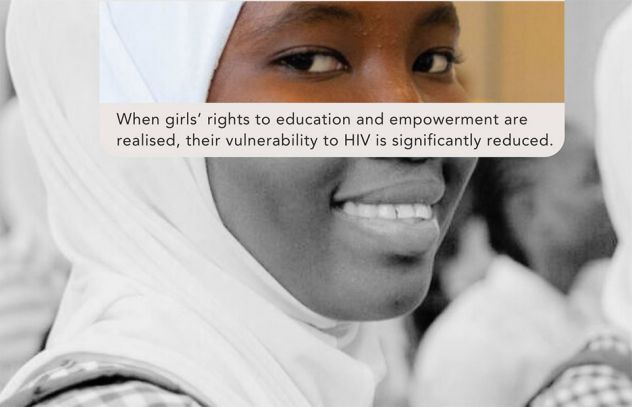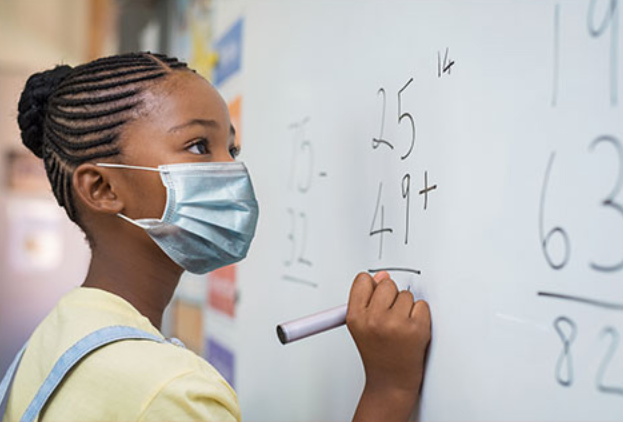LUSAKA, ZAMBIA / GENEVA, SWITZERLAND, 18 July 2022—Leaders meeting at the Africa Union summit in Lusaka, Zambia, have pledged their support for the Education Plus initiative at its continental launch, commiting to take action to keep adolescent girls in school, which will dramatically reduce their vulnerability to HIV.
Every week, around 4200 adolescent girls and young women in sub-Saharan Africa acquire HIV. In 2020, six in seven adolescents aged between 15—19 years old acquiring HIV in the region were girls. More than 23000 young women died from AIDS-related illnesses in 2020, making it the second leading cause of death among women aged 15—29 after maternal mortality in sub-Saharan Africa.
Keeping girls in secondary school and providing them with life skills, training and employment opportunities is key to ending the AIDS pandemic in Africa. Research shows that ensuring that girls complete secondary education reduces their risk of acquiring HIV by up to half, and that combining this with a package of services and rights for girls’ empowerment reduces their risk further still.
Education Plus calls for free and quality secondary education for all girls and boys in sub-Saharan Africa by 2025; universal access to comprehensive sexuality education; fulfilment of sexual and reproductive health and rights; freedom from gender-based and sexual violence; school-to-work transitions, and economic security and empowerment.
“My government has committed to the provision of free primary and secondary education for all,” said President Hakainde Hichilema of Zambia, who hosted the summit. “Education is the greatest equalizer and with appropriate education, everyone is given an opportunity to explore their full potential and be able to participate in the development process. Access to education empowers both girls and boys as it enhances their ability to access decent jobs and other means of production thus alleviating poverty.”
The President of Senegal and current chair of the African Union, Macky Sall, launched the initiative flanked by three other presidents and the Chairperson of the African Union Commission Moussa Faki Mahamat.
“It is my pleasure to join you on the occasion of the ceremony to launch the continental “Education Plus Initiative” under the leadership of the Organisation of African First Ladies (OAFLAD) in support to children and young girls in particular,” said President Sall. “There is need for action to promote women’s rights and autonomy, to fight against the discrimination and violence which girls and women face. We must address gender inequality at all stages of life. At the continental level, AU Member States are committed to accelerating the implementation of gender-specific economic, social, and legal measures aimed at combating the HIV/AIDS pandemic by adopting various policy and legal frameworks including the Maputo Protocol.”
The launch was held in partnership with the Organisation of African First Ladies for Development, convened by the First Lady of Zambia, H.E Mutinta Hichilema.
“I am confident that Education Plus will enable us all to protect, provide and preserve the lives of adolescent girls and young women by enhancing education standards and preventing new HIV infections by use of various interventions,” said Ms Hichilema.
“We lend our voice to the transformative call for gender-inclusive education in Africa,” said Leyla Gozo, Executive Secretary of the Organisation of African First Ladies for Development, “First ladies are uniquely positioned to amplify this inititiative.”
The Education Plus initiative has taken on even greater urgency as the COVID-19 pandemic pushed millions of girls out of school. Even before the pandemic, almost 34 million adolescent girls aged 12—17 years old in the sub-Saharan Africa region were not in secondary school. Evidence also shows that girls are less likely to restart school once they have dropped out.
Ten African countries – Benin, Cameroon, Eswatini, Gabon, Gambia, Lesotho, Malawi, Sierra Leone, South Africa and Uganda – have so far committed to the initiative which is jointly convened by five United Nations agencies, UNAIDS, UNESCO, UNFPA, UNICEF and UN Women, and brings together governments, civil society and international partners.
“We are making progress in Africa but not fast enough,” said UNAIDS Executive Director, Winnie Byanyima in her address to the launch. “We need to urgently address the gender inequalities that still plague the continent, with devastating impacts on poor girls and young women. We don’t have a minute to wait. Working together, we can all end discriminatory laws and harmful social norms, so that our girls are healthy, educated and empowered and can lead our continent, Africa, forward.”
UNAIDS
The Joint United Nations Programme on HIV/AIDS (UNAIDS) leads and inspires the world to achieve its shared vision of zero new HIV infections, zero discrimination and zero AIDS-related deaths. UNAIDS unites the efforts of 11 UN organizations—UNHCR, UNICEF, WFP, UNDP, UNFPA, UNODC, UN Women, ILO, UNESCO, WHO and the World Bank—and works closely with global and national partners towards ending the AIDS epidemic by 2030 as part of the Sustainable Development Goals. Learn more at unaids.org and connect with us on Facebook, Twitter, Instagram and YouTube.




